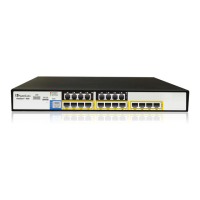30.8.7 Interworking SIP re-INVITE Messages
The device supports interworking of SIP re-INVITE messages. This enables
communication between endpoints that generate re-INVITE requests and those that do not
support the receipt of re-INVITEs. The device does not forward re-INVITE requests to IP
Groups that do not support it. Instead, it sends a SIP response to the re-INVITE request,
which can either be a success or a failure, depending on whether the device can bridge the
media between the endpoints. The device can also handle re-INVITEs with or without an
SDP body, enabling communication between endpoints that do not support re-INVITE
requests without SDP, and those that require SDP. The device generates an SDP offer and
adds it to the incoming re-INVITE request if it does not contain an SDP and only then
forwards it to the destination endpoint. This interworking support is configured by the IP
Profile parameter, 'SBC Remote Reinvite Support'.
30.8.8 Interworking SIP UPDATE Messages
The device supports interworking of the SIP UPDATED message. This enables
communication between UAs that generate UPDATE requests and those that do not
support the receipt of UPDATE requests. The device does not forward UPDATE requests
to IP Groups that do not support it. Instead, it sends a SIP response to the UPDATE
request which can either be a success or a failure, depending on whether the device can
bridge the media between the endpoints. The handling of UPDATE messages is configured
by the IP Profile parameter 'SBC Remote Update Support'.
30.8.9 Interworking SIP re-INVITE to UPDATE
The device enables communication between endpoints (IP Groups) that do not support re-
INVITE requests but support the UPDATE method, and vice versa. The device translates
the re-INVITE request to the UPDATE request, and vice versa. Note that if a re-INVITE
request arrives without SDP, the device generates the SDP and adds it to the outgoing
UPDATE request. To enable this feature, each IP Group needs to be configured with its
unique capabilities by associating it with a relevant IP Profile. For example, an IP Group
that supports UPDATE requests but not re-INVITEs would be configured as follows:
SBCRemoteReinviteSupport = 0 (Not Supported)
If a re-INVITE request needs to be forwarded to this IP Group, it is translated to an
UPDATE request.
30.8.10 Interworking Delayed Offer
The device enables sessions between endpoints (IP Groups) that send INVITEs without
SDP (i.e., delayed media) and those that do not support the receipt of INVITEs without
SDP. The device creates an SDP and adds it to INVITEs that arrive without SDP. This
intervention in the SDP offer/answer process may require transcoding. Delayed offer is
also supported when early media is present.
The interworking of delayed offer is configured using the IP Profile parameter 'SBC Remote
Delayed Offer Support'.
Note:

